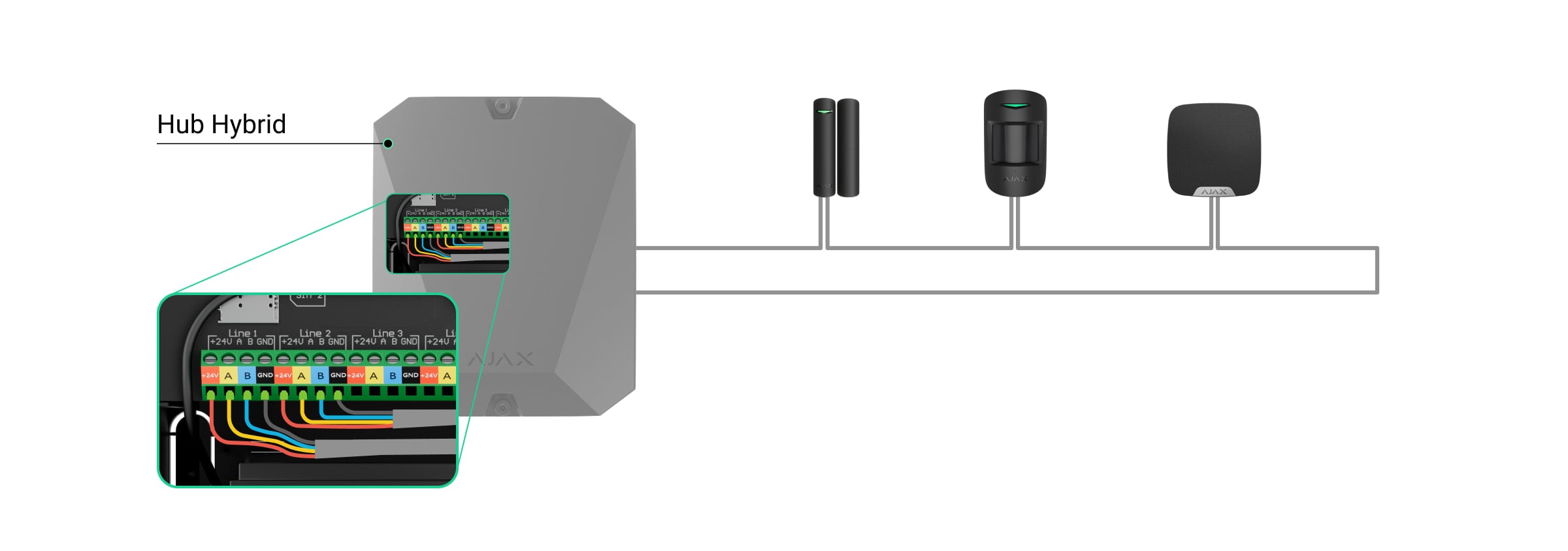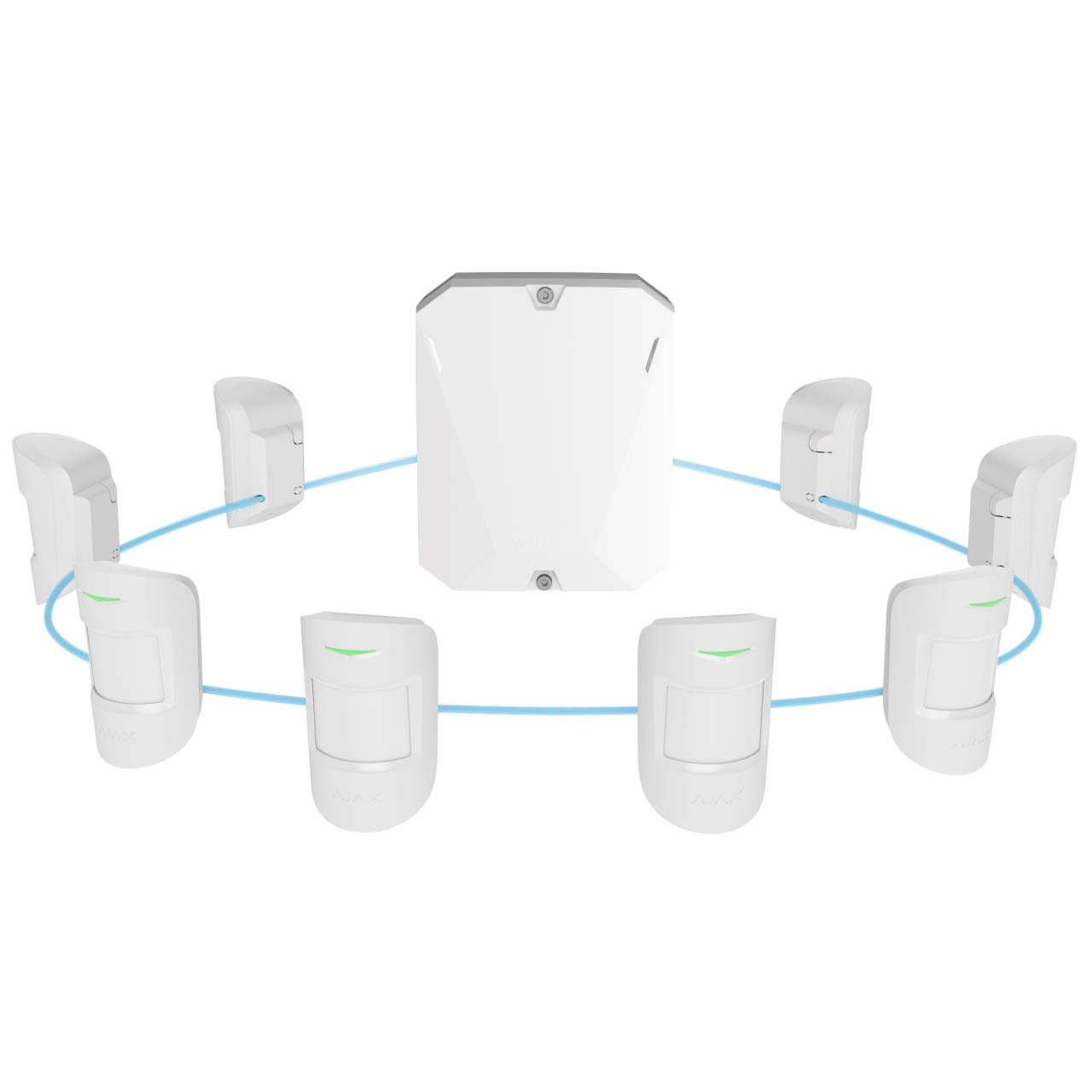With the release of OS Malevich 2.16, it became possible to connect Ajax wired devices to a hub via a Ring topology. The new topology can bring additional sabotage protection to Fibra-based systems. Also, the Ring increases the compatibility of Ajax wired setups with the existing wiring at a facility.
Fibra: High-performance wiring for high-security sites
Fibra is a wired communication protocol that connects an Ajax hub and devices. Fibra provides up to 6,550 ft of wired connectivity, which is four times more than an average solution on the market. Thanks to Fibra’s ultra-low power consumption, Ajax wired setup can be powered for up to 200 hours1 by a 12 V⎓ battery with the capacity of 7 A·h. On top of these benefits, Fibra offers advanced sabotage protection, photo verification, hassle-free installation, and remote configuration in Ajax apps.
Wired Fibra devices are part of the Superior product line. Only accredited Ajax Systems partners can sell, install, and administer Superior products.
Topologies to connect Fibra devices to a hub
An installer can use different topologies to connect Fibra devices to a hub within a system. A Beam or radial topology takes one Fibra line and provides a straightforward hub-device connection. A Ring topology, which became available with the release of OS Malevich 2.16, uses two Fibra lines to form a hub-device-hub connection.
Tree topology is also available. Using Fibra accessories, installers can branch the lines and build particularly complex systems.
Beam vs Ring topology
The Beam uses one Fibra line, which means that one hub can have up to eight beams. The devices are connected one by one without branching. The last device on the line has a terminating resistor. Such a connection provides up to 6,550 ft of wired communication without line extenders.

In case of a line break in the Beam topology, only the segment that remains physically connected to the hub continues to operate. The connection with the devices after the breakpoint is lost. Users and the monitoring company are notified of the breakage as soon as the hub detects the connection loss.
The Ring connection takes two Fibra lines, so a single hub can accommodate up to four rings. Such a connection gives up to 1,600 ft of wired communication.

What makes Ring topology stand out is how the system works in case the line breaks. If the Ring breaks in one spot, two Beams are formed. The devices on two new lines continue to operate and transmit alarms and events to the hub. Both users and the monitoring company receive a notification of the incident within 10 seconds.

Ring topology in case of a line break
Beam topology | Ring topology |
takes 1 Fibra line | takes 2 Fibra lines |
up to 8 Beams on a hub | up to 4 Rings on a hub |
up to 6,550 ft of wired communication | up to 1,600 ft of wired communication |
a terminating resistor is required | no terminating resistor is required |
does not require additional settings in Ajax PRO apps | requires additional settings in Ajax PRO apps |
When to opt for the Ring topology
Ring topology is the best choice for the areas at a higher risk of sabotage. These include rooms with windows and front doors, public places, and areas where security devices are within easy reach, e.g., outdoors. Choose the Ring connection for the lines with outdoor sirens such as Superior StreetSiren DoubleDeck Fibra or Superior StreetSiren Plus Fibra, as well as keypads installed at the entrance indoor or outdoor, e.g., Superior KeyPad TouchScreen or Superior KeyPad Outdoor Fibra. In fact, we suggest that installers use the Ring topology whenever possible since this connection significantly improves the system’s resistance to sabotage.
As an additional measure against sabotage, use Superior LineProtect Fibra, a module that protects devices on the Fibra line from short circuits. Mind that the module does not support the Ring topology.
However, a single Superior Hub Hybrid (2G/4G) supports both topologies implemented at the same time. It gives installers more flexibility in designing projects. An installer can use Beams for windowless rooms yet enhance security with the Ring in the rooms with windows. Both topologies are compatible with Ajax wired opening detectors, motion detectors, sirens, and keypads, so almost any configuration is possible.
Keep in mind that the output lines created using Superior LineSplit Fibra, Superior LineProtect Fibra, and Superior LineSupply Fibra do not support the Ring topology.
Upgrades and retrofits with the Ring topology
An Ajax System with the Ring topology is also an excellent solution to upgrade an outdated alarm system using the same topology. Installers can replace the old devices with Ajax Fibra products without changing the wiring itself or its configuration. Not only does it save much time and effort for the PRO but also cuts renovation costs for an end user.
How to set up the Ring connection
After the Ring is physically connected, installers can easily configure the topology in the Ajax PRO app. The hub determines the lines that form the Ring topology and sends a notification with an option to add the Ring to the system.
How to add the Ring automatically:
- Open the Ajax PRO app. Select the hub to which you want to add the Ring.
- In the hub states, there is an option to register the detected rings.
- Click Register.
How to add the Ring manually:
- Open the Ajax PRO app. Select the hub to which you want to add the Ring.
- Go to the Settings and click Lines.
- Select Ring connection and click the [+] icon.
- Select the numbers of the input and output lines. The numbers must be different.
- Click Add. To save the changes, click Back.
Products
When the Battery power saver feature is enabled. When it is on, the system does not comply with EN 50131 Grade 2, 3.



